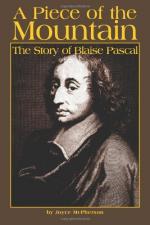|
This section contains 802 words (approx. 3 pages at 300 words per page) |

|
French Philosopher and Scientist
1623–1662
Blaise Pascal, who was born in 1623 in central France and died in Paris in 1662, made significant contributions to physics, mathematics, and philosophy during his short life. At the time of Pascal's birth, European scientific thought was moving rapidly from deductive reasoning to the experimental method of testing to understand natural phenomena. The established order resisted this new approach. One of the more drastic examples of this resistance was the harsh treatment that Italian astronomer Galileo (1564–1642) suffered at the hands of the Catholic Church's Inquisition in 1633. The church also pressured intellectuals through economic means.
 Blaise Pascal.
Blaise Pascal.
Since the sciences, mathematics, and philosophy had not become separate disciplines, it was common for intellectuals to work in several areas. Societies formed for the presentation and discussion of works in progress in these fields. Pascal's father, a lawyer by profession and a mathematician by...
|
This section contains 802 words (approx. 3 pages at 300 words per page) |

|



